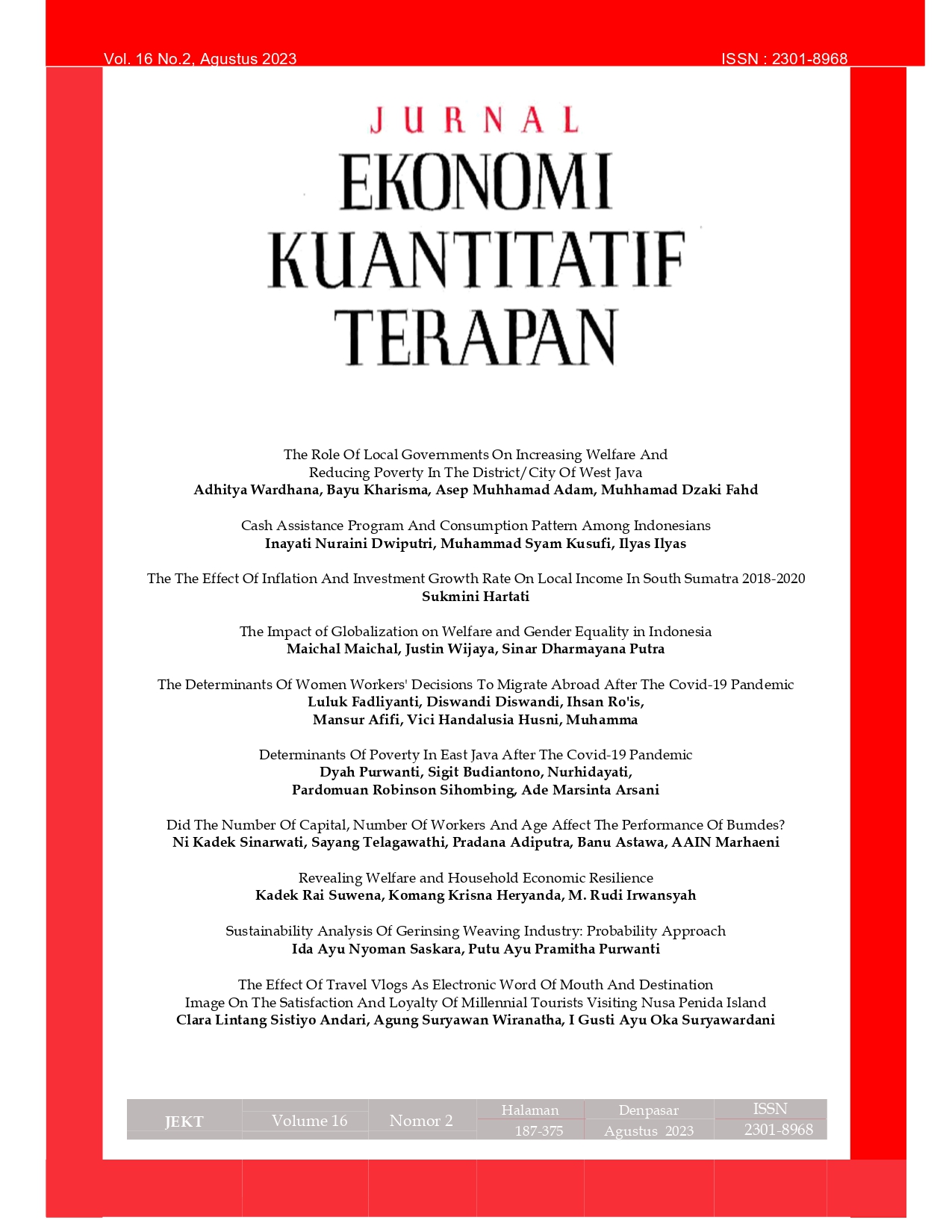Revealing Household Economic Welfare and Resilience
Abstract
Prosperity provides opportunities for households to achieve economic resilience. Economic resilience is a condition and ability to recover and rise from problems in economic aspects. The welfare condition of women in freelance daily labor households in Tiyingtali Village has not been able to reflect the economic resilience of households. This research reveals the motivation and role of women in Tiyingtali Village who work as casual daily laborers in the household to achieve prosperity and economic resilience. By using a qualitative approach, these two problems become a complex thing to discuss. Through qualitative analysis with stages: 1) data collection; 2) Data reduction; 3) Presentation of data; 4) Conclusion drawing/Verification, the welfare and economic resilience problems of women's freelance daily laborer households can be explained. To ensure the validity of the research data obtained, triangulation of sources is then carried out. Research findings show that "Gunakaya" (fighting spirit to have wealth alone or with husband) is a motivation. This motivation leads to the condition of a prosperous family. Not having savings for supplies, makes for a lack of household economic resilience. The inability of freelance daily working women to set aside their income makes it an obstacle to realizing household economic resilience. Efforts to fulfill the household economy of husband and wife must help each other to create economic resilience.
Downloads
References
Anton Irianto. (2005), Born To Win (Kunci Sukses Yang Tak Pernah Gagal, PT. Gramedia Pustaka Utama, Jakarta.
Bertham, Y.H., Ganefianti, D.W. and Andani, A. (2011), “PERANAN PEREMPUAN DALAM PEREKONOMIAN KELUARGA DENGAN MEMANFAATKAN SUMBERDAYA PERTANIAN ( WOMEN ROLE IN FAMILY ECONOMY WITH AGRICULTURAL RESOURCES UTILIZING ) ABSTRACT”, AGRISEP, Vol. 10 No. 1, pp. 138–153.
BIS. (2016), “Economic resilience : a financial perspective”, Bank for International Settlements, BIS website (www.bis.org).
BPS. (2022), Persentase Penduduk Miskin Provinsi Bali Menurut Kabupaten/Kota 2020-2022, BPS Bali, Denpasar.
Briguglio, L. and Cordina, G. (2014), CONCEPTUALIZING AND MEASURING ECONOMIC.
Bunsaman, S.M. (2018), “PERANAN PEREMPUAN DALAM MENINGKATKAN KESEJAHTERAAN EKONOMI KELUARGA”, Prosiding Penelitian & Pengabdian Kepada Masyarakat, Vol. 5 No. 2, pp. 146–157.
Fitriyah, V., Tridakusumah, A.C., Tumoka, N.D.Y., Laoh, O.E.H., Wangke, W.M., Puspitasari, N., Puspitawati, H., et al. (2013), “KONTRIBUSI DAN PERAN PRODUKTIF IBU DALAM MENINGKATKAN PENDAPATAN RUMAH TANGGA PETANI PADI Contribution And Productive Role Of Housewives In Increasing Household Income Of Rice Farmers”, Agri-Sosioekonomi, Vol. 6 No. 1, pp. 10–19, doi: 10.24156/jikk.2013.6.1.10.
Hubeis, A.V.S. (2010), No Title, 2nd ed., PT. Penerbit IPB Press, Bogor.
Ihromi. (1995), Kajian Wanita Dalam Pembangunan, 1st ed., Yayasan Obor Indonesia, Jakarta.
Makmun, A.S. (2001), Psikologi Kependidikan : Perangkat Sistem Pengajaran Modul, Revisi, Ce., Remaja Resdakarya, Bandung.
Meulen, H.A.B. Van Der, Terluin, I.J. and Matser, I.A. (2015), “THE ROLE OF WOMEN ON DUTCH FARMS”, International Farm Management Congress, Vol. 1 No. July, pp. 450–457.
Michael P. Todaro, S.C.S. (2011), Pembangunan Ekonomi, 11th ed., Erlangga, Jakarta.
Pogoy, A.M., Montalbo, I.C., Pañares, Z.A. and Vasquez, B.A. (2016), “Role of Women F armers in Improving F amily Living Standard”, International Journal of Gender and Women’s Studies, Vol. 4 No. 1, pp. 54–60, doi: 10.15640/ijgws.v4n1p6.
Ponnusamy, K. and Bonny, B. (2017), “Impact of public private partnership model on women empowerment in agriculture Impact of public private partnership model on women empowerment in agriculture”, Indian Journal of Agricultural Sciences, Vol. 5 No. June, doi: 10.56093/ijas.v87i5.70127.
Puspitawati, H. (2012), GENDER DAN KELUARGA.Pdf, edited by Elviana, 1st ed., IPB Press, Bogor.
Rahmawati, N.N. (2016), “Perempuan Bali dalam Pergulatan Gender”, Jurnal Studi Kultural, Vol. I No. 1, pp. 58–64.
Rasheed, A., Mwalupaso, G.E., Abbas, Q. and Tian, X. (2020), “Women Participation : A Productivity Strategy in Rice Production”, Sustainability, Vol. 12, p. 15.
Suryono, A. (2017), Manajemen Sumber Daya Manusia: Etika Dan Standar Profesional Sektor Publik, Universitas Brawijaya Press, Malang.
Utama, Z.M. (2020), Manajemen Sumber Daya Manusia Konsep Dasar & Teori Bahan Ajar Dan Pembelajaran MSDM, Cetakan pe., UNJ PRESS, Jakarta.
Widjajanti Isdijoso, Asep Suryahadi, dan A. (2016), Penetapan Kriteria Dan Variabel Pendataan Penduduk Miskin Yang Komprehensif Dalam Rangka Perlindungan Penduduk Miskin Di Kabupaten/Kota, edited by Handoko, G., The SMERU Research Institute, Bogor.




















